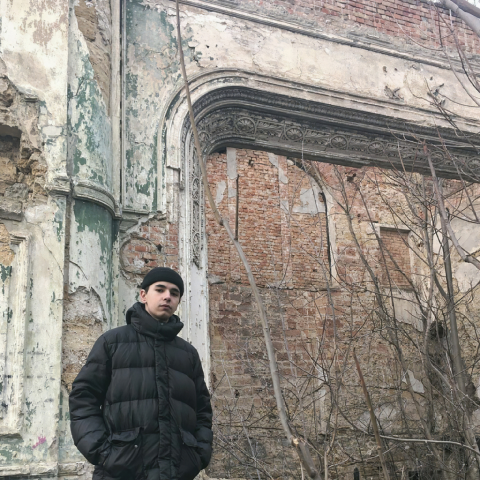
"
My name is Andrii Haran. I was born and grew up in the city of Kherson in the South of Ukraine, my family is Russian-speaking Ukrainian and my maternal grandparents are pure-blooded Belarusians.
From March to December 2022 my city was under the occupation of the Russian regime, so my history is simply impossible without the history
of my city and its heroes. Together with my mother and younger brother, who is 4 years old, I have been in Portugal for more than 7
months - as a student at FCT NOVA.
Like all Ukrainians, I woke up at 4 am on February 24, 2022, because of explosions. The Russians had bombed the Chornobaivka
airport and all day long the sounds of shells flying and explosions could be heard. One of the shells exploded in our courtyard, after
which news of the first death occurred. It was a man who had come out of a bomb shelter to fetch water for his pregnant wife. All that was
left of him was a bloody stain on the wall. Following this, a shell landed in another house in our neighbourhood, but fortunately, no one
was killed.
A few days later, Russian occupation troops reached the Kherson suburb of Oleshki and Antonovka villages, separated by the
Dnipro River and connected by the Antonovsky Bridge. The defenders of Kherson, being in the minority, for several days did not allow the
Russians to cross the bridge. Therefore, the Russians began to use artillery and fighter aircraft and strike not only at the bridge but
also, at the adjacent villages of Antonovka and Oleshki. My ex-girlfriend Lydia lived in Antonovka and most of the time she hid
with her family in the basement of their house. Their neighbour's son was killed by shrapnel and the street was filled with dead people.
Antonovsky bridge is one of the iconic places in Kherson. Every New Year's Eve the citizens liked to gather there to watch the
fireworks from both banks of the Dnipro River. Unfortunately, the invaders did make their way across the bridge. The first videos began to appear, showing the corpses of our
soldiers crushed by the caterpillars of tanks. The bridge, which had been a place of unity for the townspeople, turned into a mass grave.
The Russians surrounded our city, establishing a blockade. They did not allow humanitarian convoys into the city, deliberately
creating a shortage of medicine and foodstuffs in the city. When the humanitarian situation reached a critical point in March 2022, Russian
troops entered the city, letting Russian humanitarian aid through, filming propaganda reports about “Kherson residents tortured and
abandoned by the Kyiv regime.”
When the Russians took over the city administration, the whole world first heard about Kherson. Almost 5,000 people marched to the main
square of the city with Ukrainian symbols, preventing the occupiers from creating a picture of a conquered city. Then Ukrainian President
Volodymyr Zelensky awarded our city the title "Hero City" or "City of the Unbroken".
Every day, the citizens gathered for rallies in front of the armed Russian soldiers, until at one point the Russians opened fire on the protesters and started throwing flash grenades at them.
One of the grenades exploded at the feet of an elderly man. The Russian soldiers immediately rushed to apprehend him, but the young
lads on our side rushed into a fight with the armed soldiers to prevent them from dragging the old man away. Fists against rifles.
They succeeded; the young lads freed the old man from the occupiers without weapons and called an ambulance for him. On the same day, we
all collected money for the wounded old man's treatment.
When the situation in the city became unbearable, the rampaged Russian soldiers began to rob grocery stores and empty
houses. Then my family and I decided to leave the city. My grandparents refused to come with us because they didn't want to leave
their hometown. The safest way was through Crimea to Russia, then to Georgia and from there on a transit flight to Portugal.
On the way from Kherson to the Crimea, we met shot civilian vehicles, which the occupiers were in no hurry to remove, artillery directed towards the
city and columns of burnt military vehicles. On the border with Crimea, the Russians, after passport control, sent all men over 18
years old, including me, to the so-called "camp" for individual interrogations.
The Russians forced me to strip almost naked in search of a tattoo with "neo-Nazi" symbols, they also completely checked my
phone for photos that they considered provocative and contacts with the Ukrainian military. During this interrogation, the officer who
conducted it expressed to me his sympathy for the chauvinistic and imperialist "pro-Russian" views. After the interrogation, there was a
long journey through Crimea, Krasnodar, and in the end, we stopped for the night in a hostel in the city of Vladikavkaz in Ossetia. One
of the hostel workers told me: "It's all right, soon you will be released from the Ukrainian Nazis and the shooting will stop."
When we arrived in Georgia, we felt relieved. Georgia is an incredible country with kind, honest and helpful people. Georgians
understand us like no one else, because they, too, were victims of Russian aggression. Then nothing terrible happened to us. We arrived in Portugal, felt the
help of the Portuguese and finally feel safe.
In November 2022, Kherson was liberated. The whole world saw again, how the people of Kherson met the Russian invaders and how they met the Ukrainian liberators. The whole city celebrated for a week. Ukraine needs humanitarian and military support, not to continue this war, but put an end to it. I wish all other captured cities of Ukraine to celebrate their liberation in the same way as Kherson on November 11, 2022.